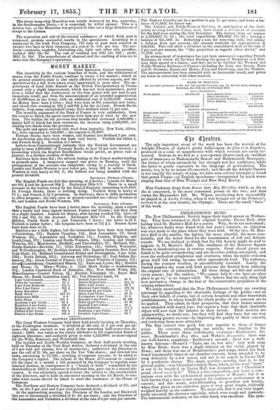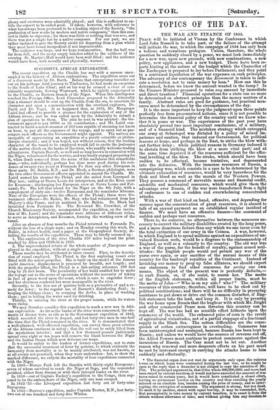PHILHARMONIC MUSIC.
The New Philharmonic Society began their fourth season on Wednes- day. They have returned to their original locality, Exeter Hall, after having tried St. Martin's Hall for a season. Why, we do not understand ; for, whatever faults were found with last year's concerts, no objection was ever made to the place where they were held. Of the two, St. Mar- tin's Hall is the smaller, the lighter, the more cheerful, the more com- fortable, and the better fitted for the transmission of soft and delicate sounds. We are inclined to think that the Old Society might do well to migrate to St. Martin's Hall. The smallness of the Hanover Square Rooms is disadvantageous in various respects. Great choral pieces are found to be quite overpowering, and are therefore seldom attempted; and even the orchestral symphonies and overtures, when the noble orchestra gives itself full awing, become often oppressively loud. The audience, during the summer weather, is uncomfortably crowded. Lastly, the limited number the room will hold prevents the Society from reducing the original rate of subscription. All these things are felt and noticed every season ; but the answer, "We cannot help it-we have no other place to go to," is no longer valid. We believe that the only thing that now prevents a change is the fear of the conservative prejudices of the veteran subscribers.
We lately mentioned that the New Philharmonic Society are courting patronage by appealing to the charitable feelings of the public-not on their own behalf, of course, but of certain hospitals and other benevolent establishments, to whose benefit the whole profits of the concerts are to be applied. They admit, in their prospectus, that their former seasons were attended with heavy loss ; but express a hope that their charitable object will now turn the balance in their favour. Their motives are praiseworthy, we doubt not ; but they will find they have but one way of obtaining greater success-by improving the quality of their concerts, and rendering them more attractive. The first concert was good, but not superior to those of former
years. Its contents, excepting one article, were familiar to the public. There were three well-known overtures-Beethoven's Eg- mont, Mendelssohn's Buy Bias, and Weber's Euryanthe; there was one well-known symphony- Beethoven's seventh ; there was a well- known bravura-Mozart's " Parte, ma tu, ben mio," very well sung by Miss Birch; there was a slight fantasia on the violin, played by Ernst ; and there was one of Mendelssohn's part songs, which has been heard innumerable times at our chamber concerts, being intended to be sung delicately by a few voices, and not to be roared in Exeter Hall by a ponderous chorus. The single novelty-novelty, that is, to the general public-was Cherubines fourth Mass, which, as the word " mitss" is not to be breathed in Exeter Hall, was designated as "Cherubim 's grand choral work in C." This is a fine composition, and bears a com- parison even with the ecclesiastical masterpieces of Mozart ; but it is well known that a mass is not adapted for continuous performance at a concert; and this music, notwithstanding its grandeur and beauty, when thus given as one unbroken piece of very great. length, evidently weighed heavily on the audience. We must add, that it was very imper- fectly executed, the choruses especially, which were rough and unsteady. The instrumental orchestra, on the other hand, was excellent. The gm.. phony and overtures were admirably played ; and this is sufficient to en- title the concert to be called good. If taken, however, with reference to what has always been professed to be a leading object of the Society, "the production of new works by modern and native composers," then this con- cert is liable to objection, for there was little or nothing that was new, and there was not a single bar by a native composer. For our part, we are rather inclined to give the Society credit for departing from a plan which they must have found inexpedient if not impracticable.
The audience was large, and we hope remunerative. But the hall was far from full, and the many empty benches added to the coldness of the evening. St. Martin's Hall would have been well filled ; and the audience would have been, both morally and physically, warmer.



























 Previous page
Previous page